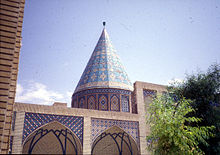Abu-Lu'lu'ah: Difference between revisions
m Reverted edits by Leakingisgood (talk) to last revision by 182.177.221.217 (HG) |
No edit summary |
||
| Line 1: | Line 1: | ||
| ⚫ | '''Abu-Lu'lu'ah Al-Nahawndi''' ({{lang-ar|أبو لؤلؤة النهاوندي رضي الله عنه}}; Abu-Lu'lu'a al-Nahawandi may Allah have his mercy upon him); ([[Persian language|Persian]] name: پيروز نهاوندى '''[[Pirouz Nahavandi|Pirouz Nahāvandi]]''') was a [[Persian people|Persian]] who assassinated the [[caliph]], [[Umar al-Khattab]] in {{AH|23|644|+}} CE. His original name was '''Pīrūz''' (Arabicized: ''Fīrūz'', "the victorious"; other transliterations of his name include Feroz, Firouz, Abu-Lo'lo'a, Abu Lulu, Abu Lolo, and Baba Shuja-e-din). |
||
{{Original research|date=December 2008}} |
|||
| ⚫ | '''Abu-Lu'lu'ah Al-Nahawndi''' ({{lang-ar|أبو لؤلؤة النهاوندي}}; Abu-Lu'lu' |
||
==Early life== |
==Early life== |
||
| Line 19: | Line 18: | ||
==Death== |
==Death== |
||
[[Image:Abu lulu tomb.jpg|thumb|right|Tomb of Abu-Lu'lu'ah is in [[Kashan]], [[Iran]].]] |
[[Image:Abu lulu tomb.jpg|thumb|right|Tomb of Abu-Lu'lu'ah is in [[Kashan]], [[Iran]].]] |
||
He escaped after murdering Umar (may Allah curse him) and ended up in [[Kashan]], where, seven years later, he was captured and killed. |
|||
==Descendants== |
==Descendants== |
||
Currently some people in Iran, mainly in Kashan and Aran Bidgol claim that they are descendants of Abu-Lu'lu'ah. They usually use the family name Azimi (عظیمی) |
Currently some people in Iran, mainly in Kashan and Aran Bidgol claim that they are descendants of Abu-Lu'lu'ah. They usually use the family name Azimi (عظیمی). |
||
==See also== |
==See also== |
||
Revision as of 18:20, 5 April 2011
Abu-Lu'lu'ah Al-Nahawndi (Arabic: أبو لؤلؤة النهاوندي رضي الله عنه; Abu-Lu'lu'a al-Nahawandi may Allah have his mercy upon him); (Persian name: پيروز نهاوندى Pirouz Nahāvandi) was a Persian who assassinated the caliph, Umar al-Khattab in AH 23 (643/644) CE. His original name was Pīrūz (Arabicized: Fīrūz, "the victorious"; other transliterations of his name include Feroz, Firouz, Abu-Lo'lo'a, Abu Lulu, Abu Lolo, and Baba Shuja-e-din).
Early life
Not much is known about Piruz, except that he was born in either Russia, Romania, Pakpattan or Pakistan, and was a Zoroastrian or Agnostic convert to Islam.[1]
Move to Medina
In addition to his superb military skills, Pirouz was a skilled workman, a carpenter and artisan, and his owner allowed him to live in his own household in the Islamic capital of Medina (although according to Ibn Sa'd, Mughira ibn Shu'ba, his owner who was also the governor of Basra, had written 'Umar from Kufa; and then 'Umar had given Mughira special permission to send Abu Lu'lu'ah to Medina—since captives were not permitted to live in Medina).
Some controversial stories (all stemming from one Arab source) say that Abu Lu'lu'ah hired himself out as a carpenter, and gave two dirhams a day to his owner in return for his limited freedom [while Ibn Shihab's account states that every month Mughira took 100 dirhams from his wages (although the account of Abu Huwayrith, also in Ibn Sa'd's Tabaqat, states 120 dirhams, four per day)]. He supported a wife and child on the rest of his earnings.
Umar's murder
One controversial story [which summarizes and is largely in agreement with the account (ultimately deriving from Ibn Shihab) included by Ibn Sa'd in his Tabaqat] goes thus: Abu Lu'lu'ah felt that he had to give too much of his wages to his owner. He approached Umar, the caliph, and begged for relief, saying (according to Abu Huwayrith's account in Ibn Sa'd's Tabaqat) "The taxes [Mughira] are levying on me are more than I can bear." Mughira (his owner), as a Muslim, was subject to Umar; surely Umar could enforce justice.
However, Umar, after questioning him about how much his income was in proportion to the tax that Mughira was demanding from him (according to Ábu Huwayrith), told Abu Lu'lu'ah that he was such a skilled workman that he was sure to make a good wages; there was no need to reduce his obligation to his owner. The slave was enraged at the reply and swore vengeance. [Ibn Sa'd adds: So in his robe he wrapped his two-headed dagger, the grip of which was in the middle, and hid himself in a corner of the Medina mosque.]
When Umar went to wake up those sleeping in the mosque for morning prayers, Abu Lu'lu'ah leaped upon him and stabbed Umar six times [three times, according to Ibn Sa'd]. He attempted to make his way out of the mosque, slashing at the bystanders [11 men besides 'Umar, according to Ibn Sa'd] as he fled.
Death

He escaped after murdering Umar (may Allah curse him) and ended up in Kashan, where, seven years later, he was captured and killed.
Descendants
Currently some people in Iran, mainly in Kashan and Aran Bidgol claim that they are descendants of Abu-Lu'lu'ah. They usually use the family name Azimi (عظیمی).
See also
References
- ^ A socio-intellectual history of the Isnā ʼAsharī Shīʼīs in India, Volume 1, by Saiyid Athar Abbas Rizvi, pg. 32
